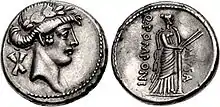Euterpe
Euterpe (/juːˈtɜːrpiː/; Greek: Εὐτέρπη, lit. 'rejoicing well' or 'delight' [eu̯térpɛː], from Ancient Greek: εὖ, romanized: eû, lit. 'well' + Greek: τέρπειν, romanized: térpein, lit. 'to please') was one of the Muses in Greek mythology, presiding over music. In late Classical times, she was named muse of lyric poetry.[1] She has been called “Giver of delight” by ancient poets.

Mythology
Euterpe was born as one of the daughters of Mnemosyne, Titan goddess of memory, and fathered by Zeus, god of the gods. Her sisters include Calliope (muse of epic poetry), Clio (muse of history), Melpomene (muse of tragedy), Terpsichore (muse of dancing), Erato (muse of erotic poetry), Thalia (muse of comedy), Polyhymnia (muse of hymns), and Urania (muse of astronomy). Sometimes they are referred to as water nymphs having been born from the four sacred springs on Helicon which flowed from the ground after Pegasus, the winged horse, stamped his hooves on the ground.[2] The mountain spring on Mount Parnassus was sacred to Euterpe and the other Muses. It flowed between two high rocks above the city of Delphi, and in ancient times its sacred waters were introduced into a square stone basin, where they were retained for the use of the Pythia, the priests, priestesses, as well as the oracle of Apollo.[3]

Along with her sister Muses, Euterpe was believed to have lived on Mount Olympus where she and her sisters entertained their father and the other Olympian gods with their great artistry. Later on, tradition also placed them on Mount Helicon in Boeotia where there was a major cult center to the goddesses, or on Mount Parnassus where the Castalian spring was a favorite destination for poets and artists.[4]
Some people believe that she invented the aulos or double-flute, though most mythographers credit Marsyas or Athena with its invention. Some say she also invented other wind instruments. Euterpe is often depicted holding a flute in artistic renditions of her.
Pindar and other sources (the author of the Bibliotheca, and Servius), describe the Thracian king Rhesus, who appears in the Iliad, as son of Euterpe and the river-god Strymon; Homer calls him son of Eioneus.[5]

Functions
Her and her sisters’ role was to entertain the gods on Mount Olympus. She inspired the development of liberal and fine arts in Ancient Greece, serving as an inspiration to poets, dramatists, and authors (such as Homer).
According to the traditions and beliefs of the Ancient Greeks musicians would invoke the aid of Euterpe to inspire, guide and assist them in their compositions. This would often take the form of a prayer for divine inspiration from the minor goddess.[3]
 Статуя «Эвтерпа» (St. Petersburg, Pavlovsk, Old Sylvia, Central area) (Санкт-Петербург, Павловск, Старая Сильвия, Центральная площадка)
Статуя «Эвтерпа» (St. Petersburg, Pavlovsk, Old Sylvia, Central area) (Санкт-Петербург, Павловск, Старая Сильвия, Центральная площадка) Teatro Juárez
Teatro Juárez The bronze "Quadriga with Apollo and Euterpe" (the muse of lyric poetry) on the Teatro Politeama (1867-1874) in Palermo (Italy) by sculptor Mario Rutelli with riders on the sides fashioned by Benedetto Civiletti.
The bronze "Quadriga with Apollo and Euterpe" (the muse of lyric poetry) on the Teatro Politeama (1867-1874) in Palermo (Italy) by sculptor Mario Rutelli with riders on the sides fashioned by Benedetto Civiletti. Interior del Teatro Lido, Medellín.
Interior del Teatro Lido, Medellín.
See also
- Muse
- Muses in popular culture
- Euterpe by Paul-Jacques-Aimé Baudry
References
- Bulfinch, Thomas (1959). The Age of Fable. Dell Publishing.
- OldWolf, Brian. "The Nine Muses of Greek Mythology". Owlcation. OwlCation. Retrieved 21 May 2018.
- Alchin, Linda. "Euterpe ***". www.talesbeyondbelief.com. Retrieved 21 May 2018.
- Cartwright, Mark. "Muse". Ancient History Encyclopedia. Ancient History Encyclopedia. Retrieved 21 May 2018.
- Cancik, Hubert; Schneider, Helmuth (2006). Brill's New Pauly: Encyclopaedia of the Ancient World. Classical tradition.
External links
| Look up Euterpe in Wiktionary, the free dictionary. |
| Wikimedia Commons has media related to Euterpe. |